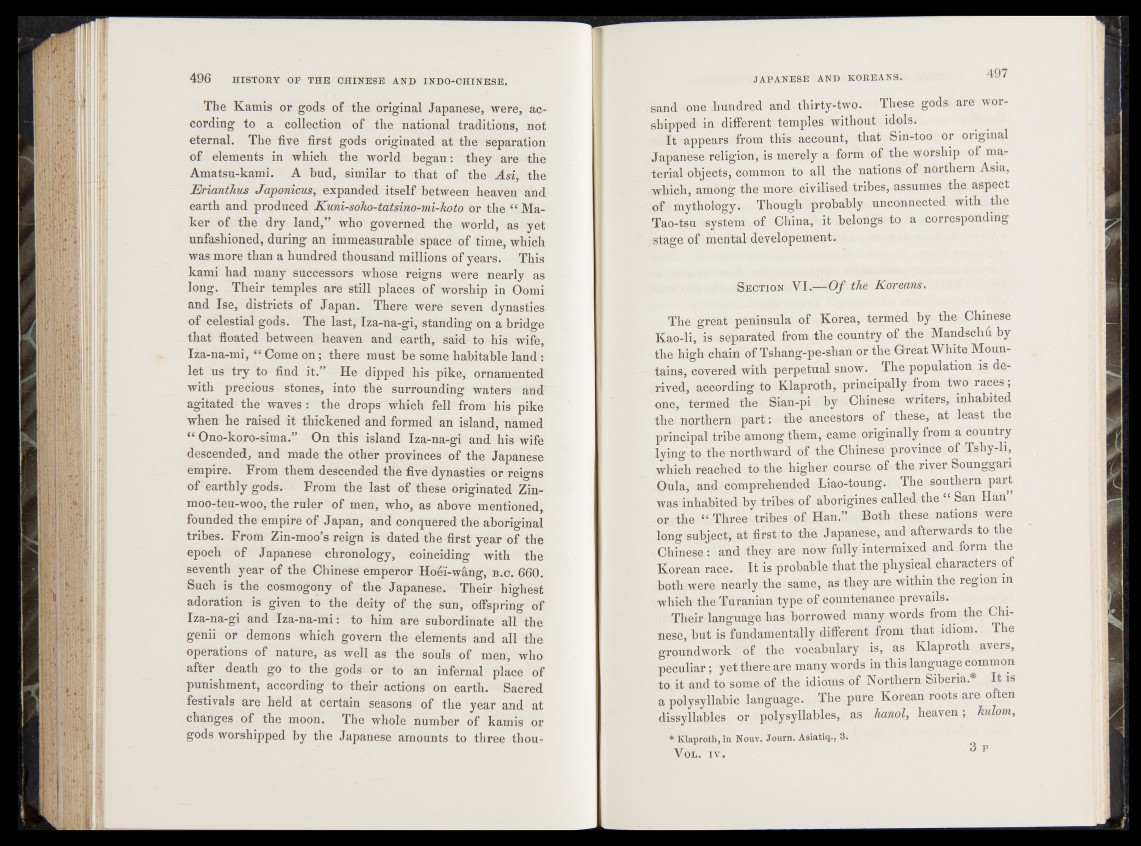
The Kamis or gods of the original Japanese, were, according
to a collection of the national traditions, not
eternal. The five first gods originated at the separation
of elements in which the world began: they are the
Amatsu-kami. A bud, similar to that of the Asi, the
Erianthus Japonicus, expanded itself between heaven and
earth and produced Kuni-soho-tatsino-mi-koto or the “ Maker
of the dry land,” who governed the world, as yet
unfashioned, during an immeasurable space of time, which
was more than a hundred thousand millions of years. T^tys
kami had many successors whose reigns were nearly as
long. Their temples are still places of worship in Oomi
and Ise, districts of Japan. There were seven dynasties
of celestial gods. The last, Iza-na-gi, standing on a bridge
that floated between heaven and earth, said to-his wife,
Iza-na-mi, “ Come on; there must be some habitable land :
let us try to find it.” He dipped his pike,- ornamented
with precious stones, into the surrounding waters and
agitated the waves: the drops which fell from his pike
when he raised it thickened and formed an island, named
“ Ono-koro-sima.” On this island Iza-na-gi and his wife
descended, and made the other provinces of the Japanese
empire. From them descended the five dynasties or reigns
of earthly gods. From the last of these originated Zin-
moo-teu-woo, the ruler of men, who, as above mentioned,
founded the empire of Japan, and conquered the aboriginal
tribes. From Zin-moo’s reign is dated the first year of the
epoch of Japanese chronology, coinciding with the
seventh year of the Chinese emperor Hoei-w4ng, b.c. 660.
Such is the cosmogony of the Japanese. Their highest
adoration is given to the deity of the sun, offspring of
Iza-na-gi and Iza-na-mi: to him are subordinate all the
genii or demons which govern the elements and all the
operations of nature, as well as the souls of men, who
after death go to the gods or to an infernal place of
punishment, according to their actions on earth. Sacred
festivals are held at certain seasons of the year and at
changes of the moon. The whole number of kamis or
gods worshipped by the Japanese amounts to three thousand
; one <kundred and thirty-two. These gods, are worshipped*,
.in different temples without idols.
I t !appears rirotm this! account, that Sin-too or original
Japanese.'religion;is ifiierely a form .of; the worship of material
objects,'hommon to all the nations of northern Asia,
which, among the inore»civilis.ed tribes, assumes the aspect
of mythology;. Thowgh^robablyi unconnected with the
Tao-tsui system of JDhinafe belongs* to a corresponding
, stage of-mental developement.
S e c t io n - V I th& Koreans.m
The great peninsula of Korea, termed by the.,CMnese
Kao-li, is separated from the country’of ,the Mandschfi by
the high chain of Tshang-pe-shan or. the. Great White Mountains,
covered with perpetual snqw. The population is derivedaccording*
to Klaproth, principally from two,races ;
one, I termed the- Sian-pi why ^Chinese writers, inhabited
the northern part: the ancestors^cfkthese^afvleast the
principal tribe among them, earner originally frpm a country
lying-to thetnorthward of the Chineset.provihce.'of ;Tshy-li,
which reached to the higher .eoursewofs'.the,riven Sounggari
Oula, and comprehended.Liao-toung.( The .southern part
was inhabited by tribes;of aborigines called the,lc San Han”
or . the “ Three tribes of Han.” Both,,the.se nations were
long subjects at first to the Japanese, and afterwards to tlie
.Chinese :*and they, are now fully intermixed and,form the
Korean race. It is ^probable that theiphysical characters,pf
both were nearly.-the same, as they are within the region in
which the Turanian type of countenance prevails. . ‘
Their language has, borrowed many words from-the Chinese,
but is fundamentally .different from that .idiom.. The
groundwork • of the vocabulary is, ust Klaproth avers,
peculiar; yet there are many words in this language common
to.it and to some.of the idioms,of Northern Siberia* , It is
a polysyllabic language. The. pure Korean roots are often
dissyllables or polysyllables, as hanol, heaven ; kulom,
* Klaproth, in Nouv. Journ. Aaiatiq., 3.
Voi. iv. , 3 p